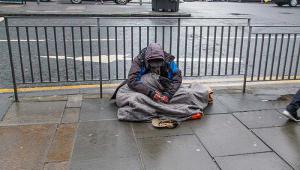Local authority spending on single homeless people has fallen by 53% between 2008-9 and 2017-18 meaning councils now spend £1bn less a year compared to nine years ago, according to research from homeless charities St Mungo’s and Homeless Link.
The charities said that the government’s manifesto commitment of ending rough sleeping by 2027 will be missed unless the government provides more cash in this year’s Spending Review.
Single people and couples without children – the groups least likely to be housed by their council – have had £5bn less spent on them in the past nine years than they would have had funding continued at 2008-9 levels. The report, produced by consultancy firm WPI Economics on behalf of the charities, noted that over the same period, homelessness in England has risen by 165%.
The charities are calling on the government to provide a ring-fenced grant to local authorities in the Spending Review to replace the Supporting People programme, which was ring fenced until 2009.
“The impact of the removal of this ring fence along with reduction in the levels of housing-related support funding has been felt acutely by homelessness services,” the charities said.
Howard Sinclair, chief executive of St Mungo’s, said: “This shocking billion pound a year funding gap must be a wake-up call for the government. If the government does not act to restore funding to previous levels, it is likely to miss its target of ending rough sleeping by 2027.
“The human cost of these cuts is all too real. The people we work with – many struggling with poor mental health, substance use of domestic violence – are often being left with no option but to sleep rough.”
Rick Henderson, chief executive Homeless Link, said local authorities have a “key role” to play in preventing homelessness by they can only do so if they have enough money for services.
“Guaranteed and long-term funding for councils to prevent and resolve homelessness would be a game changer. It would allow for focused, joined-up, strategic commissioning of services that truly work,” he said.
The charities noted that while the Homelessness Reduction Act will go “some way” to addressing homelessness problems, it will not undo the reduction in spend in recent years.
Martin Tett, Local Government Association housing spokesperson, said: “Councils want to end homelessness by preventing it happening in the first place, but are currently housing more than 200,000 homeless people, many of them children, in temporary accommodation.
“The government needs to use its upcoming Spending Review to reform the welfare system, free councils to build more social homes, and sustainably fund them to deliver homelessness services.”
Separate research from the campaign group Manifesto Club found a dramatic rise in the number of council-issued Public Space Protection Orders – powers that enable councils to tackle begging, rough sleeping and loitering.
Freedom of information data collected from 308 councils in England and Wales by the group over three sets of 18 month periods between November 2014 and January 2019 found that the rate of PSPOs issued by councils shot up by 89% since the orders started (a rise from 8.1 PSPOs issued a month to 15.3).
The Manifesto Club sent FOI requests to all 347 councils.
The group said that councils in England and Wales were not adhering to Home Office guidance, which says that PSPOs should not be used to target rough sleepers.
Josie Appleton, director of Manifesto Club, said: “Thousands of people are being criminalised for actions such as sitting on the floor, appealing for charity donations, or asking for casual work.
“PSPOs often target the homeless and others who lack the power to defend themselves. These orders are illiberal, scary and a public joke.”
Minister for housing and homelessness Heather Wheeler said: “No-one should ever be without a home and the Government is committed to preventing and reducing all forms of homelessness, backed by £1.2 billion of funding so far. We have also implemented the Homelessness Reduction Act, which helps more people get the support they need, and at an earlier stage.
“The £100m-backed Rough Sleeping Strategy was launched last year and sets out the Government’s blueprint for ending rough sleeping for good – including access to specialist support services and housing advice. As part of this, the Rough Sleeping Initiative will provide an estimated 2,600 additional beds and 750 more support staff for the most vulnerable people in our society.”
Update at 09:45am on 24/04/19 - comment from Heather Wheeler was added.









